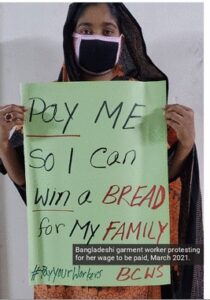H&M, Nike and Primark use pandemic to squeeze garment workers

In a hard-hitting new research report, the Nederland based Clean Clothes Campaign finds that H&M, Nike and Primark have driven factory workers in their supply chains in Bangladesh, Cambodia and Indonesia into desperation during the COVID-19 pandemic. Interviews conducted with 49 garment workers in these countries demonstrate that the Coronavirus-induced crisis continues to have a devastating impact on the wages, working conditions, and labor rights of garment workers.
Over half of the workers interviewed for the report, “Breaking Point: wage theft, violence and excessive workloads are pushing garment workers to breaking point during the pandemic”, indicated to the researchers that they experienced wage cuts during the pandemic. Almost 70% of the interviewed workers have endured periods in which they were not paid their normal, pre-pandemic wages. All of these workers were surviving on poverty wages before the pandemic, and now it has become even harder for them to make ends meet. The research shows that this is happening to workers in all three brands’ supply chains.
The research shows that wage theft during the pandemic has occurred in H&M’s, Primark’s and Nike’s supply chains; they are clearly not doing enough to protect workers from the financial impact of the COVID-19 crisis that is for a large extend caused by their own business decisions to cancel or cut down orders and push down prices. The average monthly income of the interviewed workers has decreased. Eleven Primark workers estimate that they are owed $2890 combined, eighteen H&M workers estimate the amount owed to them is $2368 and thirteen Nike workers estimate they are owed $1527. Furthermore, workers report increased production targets, unsafe working conditions, and harassment from management.
“The stories that workers shared with us are full of despair and fear: “will I have an income this month and will I be able to feed my family today?” Put simply, brands and factories are pushing workers beyond their breaking point during the pandemic,” said report author Meg Lewis.
In Bangladesh, the second largest garment exporting country a worker said, “I have to pay debt, water, and electricity bills monthly, but my wages are not enough. I don’t want to see high production targets with a decreasing number of workers to meet them. We don’t have enough income to pay for our basic living costs.”
This is what happening in the supply chains in Bangladesh, Cambodia and Indonesia into desperation during the COVID-19 pandemic, the said report finds.
Pic taken from Breaking Point — Clean Clothes Campaign


